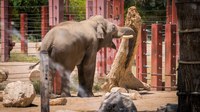Albert, Asian elephant at the ABQ BioPark, tests positive for tuberculosis
Early detection key to identifying disease before Albert showed any symptoms; prognosis is good for full recovery
Albert, a 24-year-old Asian elephant bull at the ABQ BioPark, has tested positive for tuberculosis (TB). The bacterial infection is not uncommon, which is why the BioPark routinely tests for it. Albert is not showing any symptoms of the disease, but laboratory tests detected the bacteria in fluid from his trunk. In efforts to cure the disease, BioPark staff will administer a rigorous antibiotic treatment that will last 12-18 months.
“Our regular preventative health care protocol allowed us to detect this disease in its very early stages,” said Dr. Carol Bradford, the BioPark’s senior veterinarian. “Albert is otherwise very healthy, and we are optimistic that this course of treatment will cure his disease.”
BioPark veterinary staff initially noticed abnormalities in Albert’s routine bloodwork. To investigate further, the animal care team collected fluid to be tested for TB.
Testing for TB is part of the BioPark elephant herd’s normal care. The elephants are trained to voluntarily participate in a trunk wash, which involves sucking a saline solution into their trunk as if they were drinking, and then blowing the fluid back out into a collection bag. The contents of the bag are then tested in multiple ways to detect all possible traces of TB bacteria.
When preliminary laboratory reports indicated a presence of bacteria, BioPark staff immediately put heightened safety measures in place out of an abundance of caution. This includes personal protective equipment (PPE) for elephant care staff, increased disinfection and limiting access to Albert’s barn. The other elephants in the BioPark herd were tested for TB, and those results are still pending.
TB is spread by bacteria from the lungs that get into the air. It is typically transmitted between individuals with prolonged close contact. The bacteria that cause TB can remain in the body as a latent infection for decades. During this latent phase, the bacteria cannot be spread. It is not known what causes latent bacteria to become active.
BioPark guests are not at risk of contracting the disease from Albert. BioPark staff who work in animal areas are tested yearly for TB through a skin test, and staff who have recently been in Albert’s barn will test again as an additional precaution.
The BioPark has previous experience with successfully treating TB in elephants. When Irene, now 56, was rescued by the BioPark in 1998, she carried a latent TB infection that became active and caused TB disease in 2000. In 2010, Alice tested positive for the same strain of TB, so both she and Irene were treated again. Both Irene and Alice have tested negative for the disease since 2012.
DNA sequencing will determine if Albert’s disease was caused by the same strain of bacteria that infected Irene and Alice. This data will also be used to develop a treatment protocol that is customized for the specific bacteria in Albert’s body. Some strains of TB bacteria are drug resistant, so it is important to not begin antibiotic treatment until the exact strain is identified.
Once Albert’s lab results were confirmed to be positive, the BioPark immediately contacted public health officials and tuberculosis experts to report the bacteria and begin preparations for eventual treatment of the disease.
Media;
A BioPark veterinarian will be available for interviews on June 13 at 3 p.m at the ABQ BioPark Zoo. Please meet at the main entrance by 2:55 p.m. to be escorted to the Elephant habitat.
Photos and video of Albert are available here. There is also a trunk wash demonstration with Rozie. This demonstrates how the elephants are trained to participate in their own healthcare and show how we routinely test them for TB.

